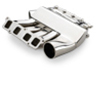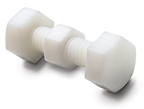![]()
FORTUS Thermoplastic Applications:
 Parts for Functional Prototyping
Parts for Functional Prototyping
Prototypes produced by Fortus systems are more accurate and durable than can be produced via other additive fabrication processes. They can be used throughout the design and functional testing process. These prototypes speed your time to market, drive down costs, and unleash you from the limitations of lesser grade systems. Make multiple design iterations to optimize design and fi nd design errors early in the design process when changes are the least expensive to make.
 Parts for Manufacturing Tools
Parts for Manufacturing Tools
Manufacturing tools, such as jigs, fi xtures, drill guides, and check gauges can be quickly and cost-effectively produced with Fortus additive fabrication systems — a process called direct digital manufacturing (or rapid manufacturing). This process eliminates machining or tooling, shaving months and tens of thousands of dollars off scheduling.
Reduce Time
- No waiting for machining or tooling
- Just in time manufacturing - Components can be made on demand reducing inventory requirements
- Bring production of jigs, fixtures, and tooling masters in-house
Reduce Cost
- Eliminate or reduce machining and tooling costs
- Customers realize ROI after just a few jobs by eliminating the need for tooling
- No cost-penalty for manufacturing complex geometries
Other Benefits
- Design complex geometries with no tooling constraints
- On-the-fly design changes and enhancements can be made during production cycles
 Parts for End-Use
Parts for End-Use
Instead of machining parts or cutting a tool for molding, direct digital manufacturing (DDM) can be a cost-effective and simpler alternative. Now the production process can start as soon as the part’s CAD fi le is sent to an additive fabrication machine without the cost and time associated with tooling or machining.
- No waiting for machining or tooling
- On-the-fly design changes and enhancements can be made during production cycles
- Just in time inventory possible
- No machining or tooling costs
- Customers realize ROI after just a few jobs
- Reduced inventory requirements — components can be made on demand
Reduce Time
Reduce Cost
Advanced Applications
Fortus 3D Production System’s advanced hardware, improved output, robust materials, large capacity and sophisticated software, enables you to build parts that stand up to demanding requirements and conditions. Fortus application engineers have developed unique applications for parts manufactured by Fortus systems. Techniques range from as simple as painting to more complex applications such as RTV Molding, Molded Paper Pulp and Sand Casting and many more.
Electroplating deposits a thin layer of metal on the surface of a part built on a Fortus 3D Production System. This improves the part's mechanical properties and gives the appearance of production metal or plated parts and provides a hard, wear-resistant surface with reflective properties.
Polycarbonate FDM molds are used in the blow molding process, reducing lead time and expense. In five days or less, companies can design a mold, build the tool and blow mold near production-quality prototypes.
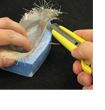 Fiberglass forms using FDM molds
Fiberglass forms using FDM molds
CNC machining is a costly and time consuming process to produce a lay-up. Handcrafting a lay-up mold is a laborious process requiring skilled workers. Much of this labor goes into the mold's lay-up, but a lot of time will go into the design iterations. Using FDM to produce the molds can reduce labor costs and time.
.jpg) Investment Casting
Investment Casting
Investment casting, also called lost wax casting, is widely used for producing ferrous and nonferrous metal parts. Unlike other casting processes, investment casting produces net shape parts with excellent surface finish and dimensional accuracy. Using FDM eliminates the need for tooling in the casting process, saving weeks of production time.
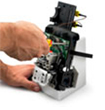 Manufacturing Tools
Manufacturing Tools
Manufacturing engineers rely on tools such as jigs fixtures, templates, and gauges. Fortus 3D Production Systems produce manufacturing tools in hours. Producing parts in thermoplastic reduces part weight, consolidates into a single build, allows you to design for function, and makes iterations quickly.
.jpg) Modular Fixtures
Modular Fixtures
A modular fixturing system is commonly used to stage parts for CMM inspections, hold work pieces during machining and position parts when bonding or assembling. Magics RapidFit module by Materialise automates the digital design process, and with just a few mouse clicks, the files are ready for production on a Fortus system.
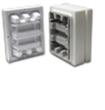 Paper Pulp
Paper Pulp
A Fortus 3D Production System is a great fit for mold making because of its thermoplastic durability. The flexibility of Fortus thermoplastic materials makes the continual vacuum/reverse-flow cycle possible without plastic cracking. After many cycles, FDM molds have shown little to no wear.
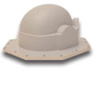 Polystyrene Molds
Polystyrene Molds
PPSF thermoplastic used by Fortus 3D Production Systems withstands high temperatures used to manufacture EPS (expandable polystyrene) parts for helmet liners. Using the FDM Process, Gentex saved $3,360-$6,360 per mold assembly and shaved 4 weeks off the manufacturing process.
.jpg) RTV Molds
RTV Molds
Parts built on a Fortus 3D Production System using FDM technology provide the fast, accurate and affordable patterns that drive RTV molding. By replacing machined patterns, the entire process can be completed in 2-3 days. And unlike machining, complex and intricate shapes have no effect on the time or cost for the FDM pattern.
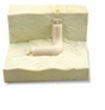 RTV Molding Soluble Core
RTV Molding Soluble Core
Complex geometries normally requiring core removal such as curved hoses, water tanks, bottles, and arterial structures are good examples where it may be helpful to use this alternative method. Instead of building the core in thermoplastic material (traditional FDM build process) the mold is built in the Water Soluble support material making it easy to dissolve away the material after casting.
.jpg) Sand Casting
Sand Casting
FDM thermoplastic matchplate mounted on an automatic molding machine can withstand the ramming forces used to pack sand casting tools. Using a Fortus 3D Production System to produce the matchplate reduces the lead time from weeks to days.
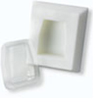 Thermoforming
Thermoforming
Fortus 3D Production Systems can quickly produce thermoforming molds in less time than conventional means. The thermoforming process becomes simpler, more efficient and increasingly cost-effective.
.jpg) Wind Tunnel
Wind Tunnel
When compared to machining and model making, FDM is a faster, less expensive and more efficient method for making detailed and accurate models for wind tunnel testing. The mechanical properties of ABS-M30, polycarbonate (PC), PC-ABS and polyphenolsulfone (PPSF) can withstand airflow forces and stresses.
.jpg) Spin Casting
Spin Casting
By replacing machined metal patterns with models produced on a Fortus 3D Production System, the entire spin casting process, including pattern making, can be completed in as little as one day. FDM thermoplastic materials can endure temperatures of 300-350 degrees F and pressures of 800 to 3,500 psi necessary during the vulcanization process.
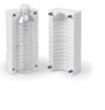 Injection Blow Molding
Injection Blow Molding
In the injection blow molding process a contoured preform is injection molded and then transferred to a blow mold cavity where it is inflated. To reduce lead time and expense, blow molders are adopting FDM technology. In five days or less, companies can design a mold, build the tool and blow mold near-production quality prototypes.
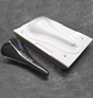 Carbon Fiber Lay-up Molds using Fortus thermoplastic
Carbon Fiber Lay-up Molds using Fortus thermoplastic
Fortus thermoplastic materials have been validated to withstand high temperatures and vacuum pressure during the fiberglass lay-up process and FDM has become a new method to produce fiber molds. Producing a mold on a Fortus production system decreases lead times, is less expensive and is more accurate.
